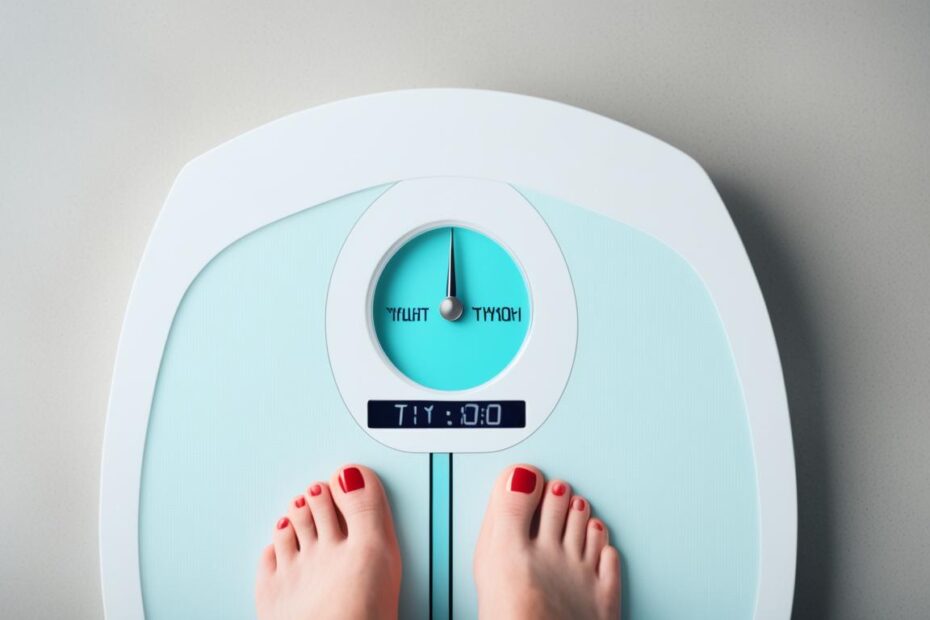I wonder about losing weight and how it links to thyroid function. It interests me, looking at what happens to our bodies when we cut calories. I always read stuff about the link between thyroid hormones and weight.
When we start losing weight, our body changes a lot. These changes can mess with our hormones, like those made by the thyroid. But, does losing weight make hypothyroidism happen? This is a big question, because we want to keep our thyroid healthy.
In this article, I’m going to talk about how dieting affects our hormones. We will look at the risks of going on extreme diets. Also, we will see how to lose weight safely without hurting our thyroid. Let’s find out more about how losing weight and our thyroid are connected.
The Relationship Between Weight Loss and Thyroid Function
Losing weight affects how our thyroid works and our metabolism. It’s important to know this when starting to lose weight.
Thyroid Hormones and Metabolism
Our thyroid hormones are big players in how our body uses energy. They affect heart rate and body temperature. So, when we shed those pounds, our thyroid hormones can shift. This changes how our body burns energy.
Calorie Restriction’s Impact
Eating fewer calories affects thyroid hormone levels. My research showed that diets with very low calories can really lower T3. T3 is a big deal for your thyroid. Lower levels slow your metabolism, which can stall weight loss.
Metabolic Adaptation
Our body is pretty clever. When we slim down, it tries to save energy. This can lead to a slower thyroid after weight loss. It’s like a safety feature. But, it can also make keeping off the weight a challenge.
- Metabolism slows down
- Body tries to conserve energy
- Weight loss becomes harder
Knowing these body changes is vital for losing weight healthily. Balancing weight loss with thyroid health and a strong metabolism is key.
Can Weight Loss Cause Hypothyroidism?

Have you ever wondered about losing weight and your thyroid health? While losing weight is good, extreme dieting can hurt your thyroid. Not eating enough can lower the production of thyroid hormones, especially T3. This makes it hard to lose weight because your body’s metabolism slows down.
Eating too little can make you miss out on important nutrients. These are needed for your thyroid to work well. Studies show that iodine, selenium, and zinc are key for thyroid health. Not having enough of them can cause hormone issues and maybe thyroid problems.
Fat loss and thyroid health are tricky topics. It’s not as simple as just eating fewer calories. Stress from trying to lose weight quickly can also harm your thyroid. Thyroid issues are more common in women, especially if they are over 60.
If you’re losing weight, here’s how to take care of your thyroid:
- Aim for gradual, sustainable weight loss
- Eat a balanced diet rich in thyroid-supporting nutrients
- Avoid extreme calorie restriction
- Manage stress through relaxation techniques
You can lose weight without hurting your thyroid. If you worry about your thyroid while dieting, talk to a doctor. They can help you with advice just for you.
The Effects of Crash Dieting on Thyroid Health
Crash diets can hurt your thyroid health. I’ve seen how bad it is to cut out too many calories. This can really mess with your thyroid.
Let’s talk about what happens when you starve yourself or eat very little.
Risks of Severe Calorie Restriction
When you eat way fewer calories, your body panics. It slows down making an important thyroid hormone, T3. Studies show a daily 400-calorie diet can drop T3 by 66%.
Even with 1200 calories a day, T3 can fall by 40%. This makes losing weight even harder.
Nutritional Deficiencies and Thyroid Function
Crash diets don’t give your thyroid what it needs. Your thyroid needs minerals like selenium, iron, and zinc. Not getting enough of these can cause big problems.
- Less hormones made
- Inflammation in the thyroid gland
- Worse symptoms of hypothyroidism

Psychological Impacts of Extreme Dieting
Crash diets can stress you out bad. This stress can mess with your thyroid hormones. It can lead to problems like:
- High cortisol levels
- Mood swings and being easily annoyed
- Troubling with focus
Remember, slow and steady wins the race in losing weight. Crash diets are a no-go. Eat well and move a lot for a healthy thyroid.
Understanding Metabolic Adaptation During Weight Loss
At first, I didn’t know my body would fight back on my weight loss journey. Metabolic adaptation is a cool thing our bodies do. They adjust to keep us alive when we eat less, slowing our metabolism.
This change affects how our thyroid works and our body’s energy use. The thyroid makes less T3, which keeps our metabolism going. With low T3, our body burns fewer calories when we’re at rest. It’s like our body saves energy.
This change can last even after we start eating normally again. That’s why people might gain the weight back fast. Our slow metabolism makes it tough to keep off the pounds.
- Metabolism slows to conserve energy
- Thyroid produces less T3 hormone
- Calorie burning decreases at rest
- Effects can persist after diet ends
Now, I focus on long-term, healthy weight loss. I avoid quick diets that don’t last. By working with my body, I’m having better success in staying healthy.
Hormonal Changes Associated with Rapid Weight Loss
Rapid weight loss can change hormones a lot, especially the thyroid’s job. These changes can affect how the body burns energy and your health. It’s important to handle them well.
Alterations in T3 and T4 levels
When losing weight fast, T3 and T4 hormone levels can go up and down. One study found that starting with more T3 and T4 linked to losing more weight first. Also, as T3 levels changed, so did weight, metabolism, and other body signs.
Impact on thyroid-stimulating hormone (TSH)
TSH levels change with weight. A study shows TSH levels might rise with weight, linking TSH and gaining weight. But, some studies don’t agree, showing a complicated link between the thyroid and body weight.
Long-term consequences of hormonal imbalances
Changes in hormones during dieting might stick around. After losing weight, some people may need to change their thyroid medicine. It’s important to keep an eye on your thyroid even after losing weight to stay healthy.
Knowing how these hormones change is vital for losing weight safely, especially if you have thyroid issues. Before any diet, talking to a healthcare expert is a must. They can make sure the plan is right for you.
Safe Weight Loss Strategies for Thyroid Health
A gentle plan is best for thyroid health and losing fat. Crash diets can cause more harm than good, like missing key nutrients. Try cutting 500-750 calories a day for safe weight loss.
Eat foods with iodine, selenium, and zinc to help your thyroid. I add seafood, nuts, and whole grains to my diet. These foods are great for thyroid health while losing weight.
Exercise and sleep are very important, too! They help keep hormones in check and your metabolism up. If you take thyroid meds, talk to your doctor. They can make sure your dose is right for you while losing weight.
